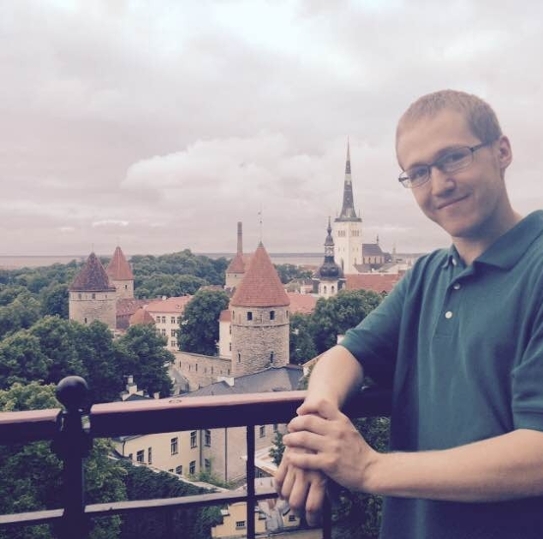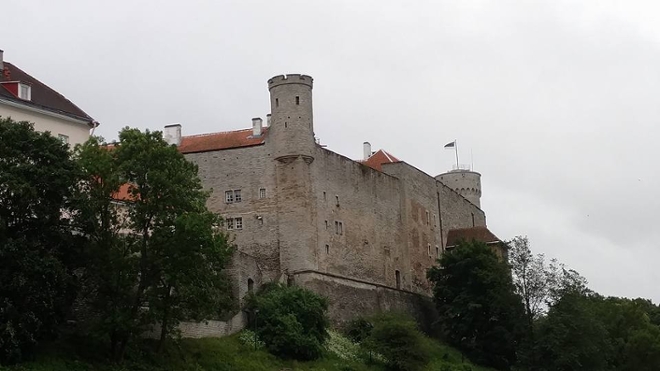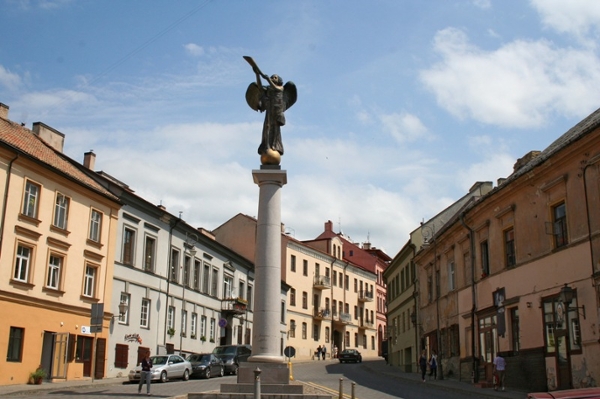Week 5: Tallinn, Uzupis, and Research
As promised, I will start this post off with a brief description of Tallinn, Estonia. Of the major cities I have visited so far, Tallinn had the most medieval feel. The stone wall that was built by the Danes (Tallinn roughly means “Danish castle” and follows the Danish conquest of Estonia) to defend the city in the Middle Ages is still mostly standing, and towers dating back to the Thirteenth and Fourteenth Centuries are still prevalent. In fact, the Estonian Parliament is still housed in Toompea Castle, a stronghold in use since at least the Ninth Century. The old town is essentially split into the upper town, positioned atop the hill, and the lower town, and there is an interesting history between the two. The lower town was comprised primarily of self-made merchants, while the upper town housed the rulers of Estonia. For quite some time, the two districts had their own governments and their own laws. Lower town was more democratic, and slavery was outlawed, while slavery was pervasive in the monarchical upper town. So fraught with tension was this arrangement that gates were built between them and locked up every night. Along with Tallinn’s well preserved sense of history comes modern industry. It is known as the Silicon Valley of Europe (Skype was started there) and has more startups per person than any other city in Europe. Tallinn represents a fascinating blend of old and new.


Back in Vilnius I had the occasion to cross the Vilnia River into the Republic of Užupis (literally “other side of the river”). Užupis is a neighborhood of Vilnius that happened to declare its independence on April 1, 1997 (the date may not be a coincidence) and continues to operate as if it were an independent republic, despite receiving no recognition as such from any other body. A district of artists, the Republic has a government and a president (you can even get your passport stamped there), an anthem, an army (numbering approximately 11 men), and, most amusingly, a constitution. The Constitution includes such priceless provisions as “a dog has the right to be a dog,” “everyone has the right to celebrate or not celebrate their birthday,” and, paradoxically, “everyone has the right to have no rights.” Along with several unusual statues (including backpacker Jesus), the neighborhood is definitely one of a kind.

I have been balancing numerous projects with VIL IAS. As referenced in previous posts, my main focus has been on corruption. I am hoping to implement a project for the protection of whistleblowers. Lithuania has problems with both public and private corruption. This is likely a vestige of Lithuania’s Soviet occupation, and many older businessmen do not see bribery as a harm, but merely just another aspect of doing business. This corruption is difficult to combat, as whistleblowers are poorly protected, and there is no comprehensive law in place for their protection. Luckily, while whistleblowers were often seen as undesirable snitches under the former Soviet Union, today most Lithuanians have a positive view of whistleblowers. Our project has several elements. One is to appeal directly to law firms to engage in pro bono representation of whistleblowers, relying on existing labor laws to defend them against reprisal. There is not a robust pro bono system in Lithuania as there is in the United States. It is generally thought that if a law firm is engaged in pro bono work, it is only because it is not reputable enough for paid work. I hope to change that mindset by presenting good business reasons for pro bono work. Research conducted in the United States have found that firms that engage in extensive pro bono activities tend to be more profitable, attract better qualified associates, and have a lower turnover rate. To that end, we will meet with many law firms in Vilnius next week to discuss our proposal. Additionally, I hope to engage legal aid clinics such as the one at Vilnius University to provide services to whistleblowers, many of whom are lower positions at their company.
Another aspect of this project is providing psychological support for whistleblowers. Even in circumstances where there is no formal reprisal, whistleblowers can feel ostracized by their coworkers, and research has shown profound psychological impact. Providing support can help incentivize more people to report corruption when they see it. This is tied into another VIL IAS project to provide support services for victims more generally. There are organizations in place in Lithuania that provide support services for victims of sexual assault or domestic abuse, but scarce services for victims of other crimes, something VIL IAS is attempting to remedy. Another project (admittedly a less legal one) that I have assisted with is the implementation of educational services for citizens 54 years or older, whether vocational services or services that can mobilize them to be more involved in their communities.
It is inspiring being around such committed volunteers. The researchers at VIL IAS do not draw a paycheck, and everyone is together with the sole aim of creating a better Lithuania. I hope that I can continue to provide substantial aid to that worthy endeavor.